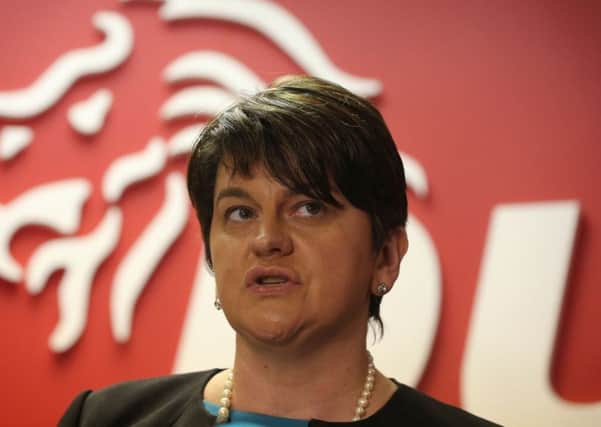Jim McAuley: Political turmoil in Belfast could hit Brexit plans


It was not over a constitutional or security issue, so often the focus for tension in the past, but rather fuelled by a government-promoted scheme, the Renewable Heat Incentive (RHI) that has left the Belfast administration facing a £490m bill.
His announcement ended a decade-long coalition with the Democratic Unionist Party (DUP), it also saw the end of Arlene Foster’s tenure as First Minister. Under the structures fashioned following the Good Friday Agreement, neither Stormont’s First Minister nor Deputy First Minister can remain in post alone. New elections will be activated unless Sinn Fein nominates a new Deputy First Minister, which it has promised it will not.
Advertisement
Hide AdAdvertisement
Hide AdHis decision came as First Minister Foster refused to stand aside to facilitate an investigation into the slipshod eco-energy scheme set in place to offer business an incentive to run eco-friendly boilers.
The subsidy tariffs of the RHI were set too high and with no cap on the amounts that could be claimed. The result was the state being locked into 20-year contracts that not only provided free heat, but also allowed those who had signed up to make money in doing so. Stories soon spread of farmers allegedly set to pocket around £1m in the next two decades for heating empty sheds. With typical black Belfast humour, it has become known as the ‘cash for ash’ case.
Mrs Foster oversaw the ill-fated energy scheme during her time as economy minister and, consequently, has universally been accused of incompetence by all rival parties. Sinn Féin’s demands for her to step down temporarily pending the outcome of a preliminary investigation fell on deaf ears, as she refused to step aside to allow an independent investigation.
As so often in Northern Ireland, diametrically opposing views have emerged. Sinn Féin claim the DUP handling of RHI is out of step with a public mood, they must be held accountable for the squandering of public money and have displayed an overall lack of respect for all things Irish. The DUP, on the other hand, assert that Sinn Féin were not genuine in their criticism of RHI, and were exploiting the crisis in response to a broader agenda, which included growing criticism from their core support that they were not performing in the Assembly, and condemnation from dissident republicanism. Their motivations, for the DUP, were seen as political rather than principled. Whatever the truth, the views appear irreconcilable.
Advertisement
Hide AdAdvertisement
Hide AdMeanwhile, James Brokenshire the Northern Ireland Secretary, is left with the unenviable task of having to negotiate with Sinn Féin and the DUP before fresh elections are triggered. Indeed, an election within the next six weeks now seems all but inevitable, but what will be the outcome?
There is the possibility that the electorate will reject both the DUP and Sinn Féin, disillusioned by the continuation of Orange and Green politics in what is supposed to be a new shared future. More likely, however, faced with the ballot box the election will take on a distinctly sectarian hue in a highly divisive poll. Always likely to be fiercely contested, it will be even more so as there will be 18 fewer seats in the Assembly following proposed changes by the Boundary Commission.
The most probable result, however, is a return to the existing state of affairs, a simple reproduction of the position in the Assembly today. It is most likely that the result will see the DUP returned as the largest party with Sinn Féin as the second largest, giving the former the First Minister and the latter the Deputy First Minister. Given Sinn Féin’s pledge of no return to the status quo, the workings of government will not start up and Northern Ireland’s institutions will be at a complete cessation. In those circumstances it is most likely that direct rule, last in place in 2007, would be reinvoked, although this time the Irish Government may also demand a greater say.
Obviously, there are implications in all this for the stability of Northern Irish politics but the consequences may be much wider.
Advertisement
Hide AdAdvertisement
Hide AdDoubt about the stability of the political arrangements in Northern Ireland could well create problems for Brexit plans. Theresa May’s timetable to activate the EU exit process by the end of March could come under pressure. As the Supreme Court is currently determining whether the consent of the UK’s devolved assemblies is necessary, the absence of a working administration would prove particularly problematic. Further, without a devolved government, Northern Ireland would lack any clear political voice in the lead up to, and immediate aftermath of, the triggering of our EU exit.
Professor Jim McAuley is an expert in Northern Ireland politics at the University of Huddersfield.